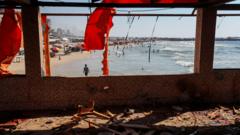The bombing of a popular cafe not only targeted a Hamas leader but also resulted in substantial civilian loss.
**Tragic Civilian Casualties in Israeli Strike Targeting Hamas Commanders**

**Tragic Civilian Casualties in Israeli Strike Targeting Hamas Commanders**
In Gaza, airstrikes raise questions about military strategy versus civilian safety.
The Israeli Defense Forces (IDF) announced that they successfully targeted a senior Hamas commander in a recent strike on a crowded seaside cafe in Gaza City, an action that has led to widespread condemnation due to the high number of civilian casualties. The airstrike on the al-Baqa cafeteria occurred on Monday, resulting in the deaths of dozens of innocent individuals, including women and children, raising serious concerns about the proportionality and justification of such military actions.
The IDF has identified the main target of the attack as Ramzi Ramadan Abd Ali Saleh, reported to be a significant figure in Hamas's naval operations. Alongside him, two other Hamas members—Hisham Ayman Atiya Mansour and Nissim Muhammad Suleiman Abu Sabha—were also killed in the strike. The IDF claimed that Saleh was actively involved in planning maritime attacks, correlating the strike with national security measures against perceived threats to Israeli citizens.
However, witnesses and health officials indicate that the scope of civilian loss was devastating. Reports from hospitals in Gaza suggested that at least 40 people were killed, a number that included artists, activists, and young students, signifying the grievous impact on the community. The al-Baqa cafe was a well-frequented gathering spot in the city, known for its vibrant atmosphere, which had drawn people even amidst ongoing conflict.
Hospital staff described horrific scenes, detailing severe injuries and substantial devastation, with many victims suffering from critical conditions that necessitated immediate medical intervention. The IDF has stated that they took measures to minimize civilian harm during the attack but provided no specifics regarding how they assessed the risks involved.
In the aftermath of these events, indirect negotiations between Israel and Hamas began in Qatar, focusing on possible ceasefire agreements and the release of hostages. This conflict follows the violent escalation that began on October 7, resulting in significant fatalities and ongoing humanitarian crises within the region. With the Hamas-run health ministry in Gaza reporting over 57,000 deaths since the onset of the latest hostilities, a solution remains urgently sought by many in the international community.
The IDF has identified the main target of the attack as Ramzi Ramadan Abd Ali Saleh, reported to be a significant figure in Hamas's naval operations. Alongside him, two other Hamas members—Hisham Ayman Atiya Mansour and Nissim Muhammad Suleiman Abu Sabha—were also killed in the strike. The IDF claimed that Saleh was actively involved in planning maritime attacks, correlating the strike with national security measures against perceived threats to Israeli citizens.
However, witnesses and health officials indicate that the scope of civilian loss was devastating. Reports from hospitals in Gaza suggested that at least 40 people were killed, a number that included artists, activists, and young students, signifying the grievous impact on the community. The al-Baqa cafe was a well-frequented gathering spot in the city, known for its vibrant atmosphere, which had drawn people even amidst ongoing conflict.
Hospital staff described horrific scenes, detailing severe injuries and substantial devastation, with many victims suffering from critical conditions that necessitated immediate medical intervention. The IDF has stated that they took measures to minimize civilian harm during the attack but provided no specifics regarding how they assessed the risks involved.
In the aftermath of these events, indirect negotiations between Israel and Hamas began in Qatar, focusing on possible ceasefire agreements and the release of hostages. This conflict follows the violent escalation that began on October 7, resulting in significant fatalities and ongoing humanitarian crises within the region. With the Hamas-run health ministry in Gaza reporting over 57,000 deaths since the onset of the latest hostilities, a solution remains urgently sought by many in the international community.



















